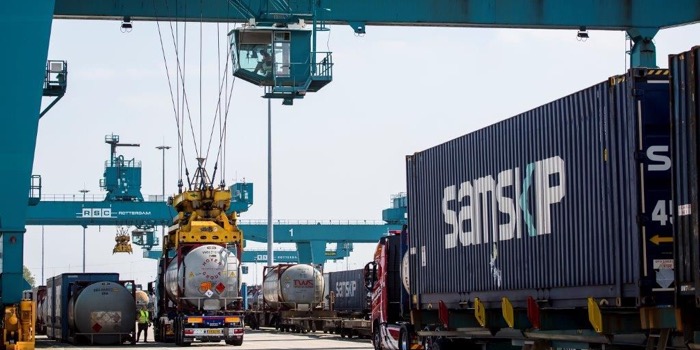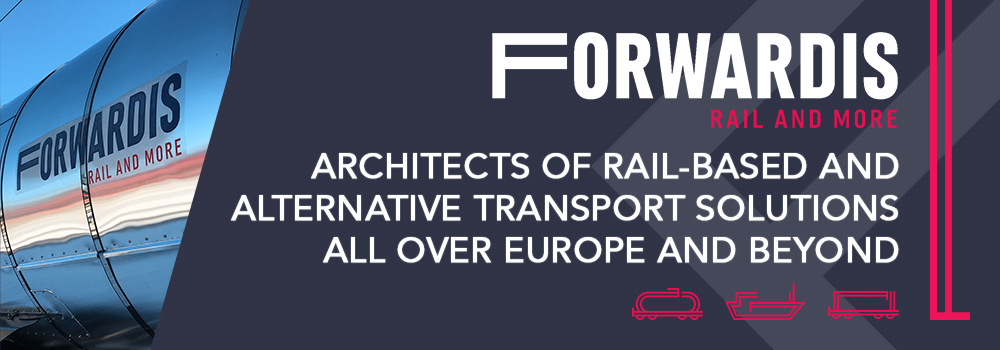RSC makes more effective use of capacity thanks to OnTrack
The process coordinators at Waalhaven’s Rail Service Center (RSC) are enthusiastic about the application OnTrack, a co-creation of the Port of Rotterdam Authority and various private parties. OnTrack provides real-time insight in the handling of freight trains at terminals in Rotterdam and allows users to track their journey to destinations in the European hinterland. This allows RSC to utilise the available rail and terminal capacity more effectively.
OnTrack bundles data provided by ProRail, terminals and rail operators and makes this information available to all links in the rail freight chain in digital form. The application has been used by 15 process coordinators at RSC since spring 2019. “We no longer need to input information in the app manually,” says Process Coordinator Marco de Keizer. “Data relating to the operations at our terminal are automatically shared with OnTrack via our Terminal Operating System (TOS).”

Quicker access to information
Every year, RSC loads and unloads some 300,000 containers on and from freight trains. To make sure these operations run smoothly, RSC’s process coordinators remain in close touch with operators and staff at other terminals. Thanks to OnTrack, they spend less time phoning and emailing each other. And the process coordinators have quicker access to information.
De Keizer comments: “We agree specific slots with rail operators for the handling of their trains. If a train doesn’t arrive at the agreed-upon time, we’re stuck with an empty track. This is a problem for us, since loading and unloading containers is basically how we earn our money. In the old days, I would phone the operator if a train hadn’t arrived 5 minutes before the start of its slot. At which point they’d sometimes tell me that the train was already running six hours late. If I had known this sooner I could have assigned the slot to a different operator and utilised our capacity more efficiently.”
No interference
Delays in rail transport are quite common, unfortunately. This is due to all sorts of reasons: from bad weather to work on the track, delays at the terminals or a faulty rail vehicle. With OnTrack, users can share such deviations from the planning in real time – enabling every player in the chain to anticipate possible delays.
Optimal planning
De Keizer always starts his shift at short terminal planning by checking OnTrack. The application allows him to filter which information he’s interested in. “I use OnTrack like a kind of Google, to make an optimal planning. Recently, after checking the app I saw that a train that was scheduled to arrive overnight was already near the terminal that afternoon. Since one of our tracks was available, I could call the operator and have his train handled sooner. But you also have cases where the operator is too optimistic about an ETA, and I decide to assign his slot to a different operator based on the information found in OnTrack. The train that’s running late is put next in line. The sooner I’m aware of a delay, the shorter I can keep such a waiting line.”
Chain-wide approach
RSC is currently the most active OnTrack user in the port of Rotterdam. The application is also used by all the major container terminals at Maasvlakte. Of the 13 rail operators that have a permit for using the Dutch railway network, 11 participate in this programme. The Port Authority is also urging other operators to join in. “We are delighted with the commitment these parties have all shown to sharing their data,” says Maarten de Haan of the Port of Rotterdam Authority. “With every new company that joins the programme, we get an even better idea of the trains’ precise location and the status of their containers and freight.”
Marco de Keizer confirms the importance of a chain-wide approach: “If the various links in the chain all share their data openly and honestly, operators have a better idea of when their train is finished at the terminals. We’ve noticed that from a competition point of view companies are occasionally sensitive about sharing data, and that they often think in terms of their own interest. But the best way to improve the rail product is by working together.”
A better rail product means that delays within the chain can be shortened – or even removed altogether.
Co-creation
The Port Authority plans to develop OnTrack further in close collaboration with the users. Among other things, the Port Authority is working on a planning module in OnTrack that removes the need for process coordinators at the terminals to draw up plannings themselves.
‘Uber button’
At RSC, they have recognised further opportunities to optimise capacity utilisation: by not only speeding up the ‘allocation process’ – i.e. the planning of incoming trains – but also the outflow of trains that have been handled at the terminal.
De Keizer comments: “When we’re nearly done with a train, we send a request via TOS asking the operator to come pick it up with an engine. We need to wait for this to have happened before moving in the next train. In many cases, it takes a while for the engine to arrive. In the meantime, the next train is kept waiting at the yard. Wouldn’t it be great if we could speed up this process?”
De Haan says: “If the terminal is able to communicate the expected end time of handling earlier on in the process, actually integrating this notification in OnTrack is fairly straightforward for us. Resulting in a kind of ‘Uber button’ that alerts operators when they can move their train out of the facility.”
For more information visit www.portofrotterdam.com
17th December 2019























